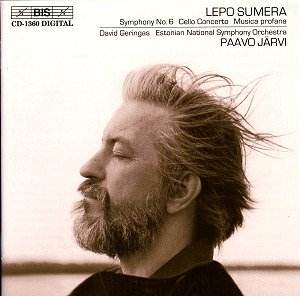Sumera was an Estonian composer who studied in
Tallinn, at first with Veljo Tormis, and then from 1968 to 1970
with Heino Eller. Sumera was Eller's last student. He worked as
a recording engineer for Estonian Radio. His reputation spans
electro-acoustic and orchestral works. The latter include six
symphonies (1981, 84, 88, 92, 95, 98), a piano concerto (1989-93)
and a concerto grosso with solo parts for soprano sax, percussion
and piano (2000).
The Cello Concerto starts with the cello,
unaccompanied, accelerating through the angst barrier to be joined
by the orchestra in a conflict ridden climax. The effect is rather
akin to the macabre rustling of Kastchei's creatures in Stravinsky's
The Firebird … but louder. If you know the Sallinen and
Kokkonen concertos this is more Sallinen than Kokkonen. It is
more melodramatic and clamant with incidents in which the orchestra
vies with the cello with equality of arms. The movement ends with
the cello ascending in hysteria towards the uttermost squealing
heights of its range. The central movement is calmer - a sort
of peaceful inscape where the range of expression includes moderate
anxiety, passion (6.01) and a sort of self-lulled peace. The finale
is energetic and rather suggestive of story-telling - the brusque
horn-topped rocking activity (2.39) suggests Pohjola's Daughter
rising to a furious pell-mell for soloist and orchestra. This
ends in a thunderously emphasised old-style peroration in which
the writing for percussion is linked with that of Jon Leifs. The
work is dedicated to both Lithuanian-born Geringas and to Paavo
Järvi.
Musica Profana is densely heavy
with thunderous Nyman-minimalist string writing rife with Tippett-like
counterpointing. Gradually the textures become more transparent
until clean violin sound emerges at 4.43. The music proceeds in
episodes with brief silences dividing incidents.
The two movement Sixth Symphony was his
last work. It is only 24 minutes long. It proceeds through a mesmerising
stasis with a sub-text of tension. Fury is belted out in an intensified
version of the outburst in the finale of Bartók's Concerto
for Orchestra with heaving writing for the drums and blaring
brass. Quiet peals of descending Penderecki-cascading violins
suggest some psychological complexity further developed in pecking
and fleeing pizzicato (12.24). The second movement returns to
the possessed and tensely thoughtful stasis of the start of the
first movement and seems to drift in and out of a focus on the
Adagietto from Mahler's Fifth Symphony. The clarinet offers
fragmented tenderness but mezzo-forte interjections from the brass
suggest threat. Sumera often reaches towards an idyllic saturation
as he also does in the Cello Concerto. It always seems to crumble
before he can fully express it. In the closing pages of the Symphony
he allowed himself that contented Philosophic mind.
The first five symphonies have already been recorded
by Bis with the Malmö orchestra conducted by Paavo Järvi.
They are BIS-CD-660, 690 and 770.
Sumera's last phase is reflected in tension (concerto),
elation (Musica Profana) and in the hard-won contentment
of the symphony.
Rob Barnett
